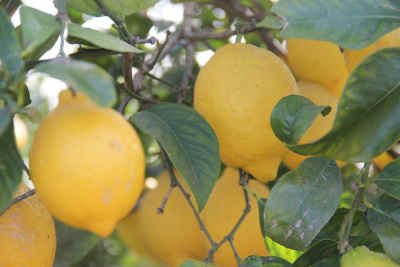Grow Your Own Lemons

There are a few varieties of lemon trees and all of them are only grown in the warmer parts of the world. If you want to grow any of them in cold climates you will need to be able to protect them during the colder months while still providing enough sunlight to keep them alive. Meyer Lemons (a cross between a lemon and an orange) can survive temps down to 22 degrees when mature so it might be a good choice for many. Luckily if you live in one of the colder climates lemon trees are commonly grown in pots and do quite well in pots.
Lemon trees are self-fertile, so it isn't a requirement to grow more than a single tree. Taking a brush and brushing each flower will pollinate your flowers while indoors and away from insect pollinators like bees.
When growing them outdoors pick a sunny spot that has well drained soil. Lemons do not like wet feet so if you plan to plant in an area that is on the wet side, you can raise the elevation by adding in sand if you land is mostly clay. This will raise the ground and help with drainage. If the ground is not mostly clay then you will just need to build up the soil by simply adding some dirt.
Lemon trees like sun and are a tree that can grow to 20 feet tall and nearly as wide. So take that into consideration when choosing where to plant. Lemon trees like acidic soils, so try to grow them around other acidic loving plants such as blueberries. This is not because the plants will help each other, however because when you are growing a number of plants it is easier to manage the soil pH in areas and not on a plant specific basis. It would suck to stunt or kill a plant just because you were liming the soil next to it to adjust the pH of the soil around its neighboring plants.
As expected water frequently when the plants are trying to get established. And they sure do love fertilizer, but don't add anything such as lime which will raise the soil pH and make it less acidic.
Most people purchase potted lemon trees but you can also start a tree from a cutting. Lemon trees are one of the best species for responding as cuttings. Lemon trees can obviously be grown directly from seed as well, but don't bother as the fruit will not likely be of much use. Once mature and producing fruit don't be shocked if it takes as much as 9 months for the fruit to grow and ripen. You will be waiting much longer if you lose patience and pick to soon.
Expect three years before you will harvest fruit. Even if your lemon tree produced fruit the first couple of years it is advisable to pick them off as they will be very small and picking them helps the plant grow properly. Once your lemon tree is producing fruit you will need to leave the fruit on the tree as it will not continue the ripening process once picked. The lemon is ripe when it turns fully yellow.
If you're bringing the lemon tree inside try to give it as much light as possible and keep it in the colder parts of the house to simulate winter.
Follow these few steps and you will have lemons forever.
